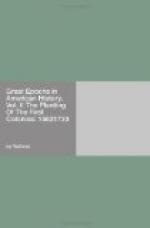[1] This account was written a year after the events described by an author whose name is unknown. Internal evidence points to his intimate personal knowledge of what took place. Writing after the failure of the rebellion; moreover, after Bacon himself was dead, and the strong popular movement led by him had consequently much disintegrated, the writer’s view is naturally somewhat out of sympathy with Bacon. Printed in Hart’s “American History Told by Contemporaries.”
John Easton Cooke, in his “History of Virginia,” declares that Bacon was “the soul of the rebellion” and his rising “not a hair-brained project, but the result of deliberate calculation.” As a representative of the Virginia people Bacon “protested strongly against public grievances, compelling redress.” He anticipated that the country would profit from his uprising, “and his anticipation was justified.” The result as against Berkeley, “compelled the dissolution of the Royal Assembly, which had remained unchanged since 1680, and resulted in ‘Bacon’s assembly,’ which began by raising the public revenue, extending suffrage to freemen, and was so defiant that Berkeley dissolved it.”
KING PHILIP’S WAR
(1676)
BY WILLIAM HUBBARD[1]
The Occasion of Philips so sudden taking up Arms the last Year, was this: There was one John Sausaman, a very cunning and plausible Indian, well skilled in the English Language, and bred up in the Profession of Christian Religion, employed as a Schoolmaster at Natick, the Indian Town, who upon some Misdemeanor fled from his Place to Philip, by whom he was entertained in the Room and Office of Secretary, and his chief Councellor, whom he trusted with all his Affairs and secret Counsels: But afterwards, whether upon the Sting of his own Conscience, or by the frequent Sollicitations of Mr. Eliot, that had known him from a Child, and instructed him in the Principles of our Religion, who was often laying before him the heinous Sin of his Apostacy, and returning back to his old Vomit; he was at last prevailed with to forsake Philip, and return back to the Christian Indians at Natick where he was baptised, manifested publick Repentance for all his former Offences, [15] and made a serious profession of the Christian Religion; and did apply himself to preach to the Indians, wherein he was better gifted than any other of the Indian Nation; so as he was observed to conform more to the English Manners than any other Indian.
Yet having Occasion to go up with some others of his Country men to Namasket, whether for the Advantage of Fishing or some such Occasion, it matters not; being there not far from Phillips Country, he had Occasion to be much in the Company of Philips Indians, and of Philip himself: by which Means he discerned by several Circumstances that the Indians were plotting anew against us; the which out of Faithfulness to




